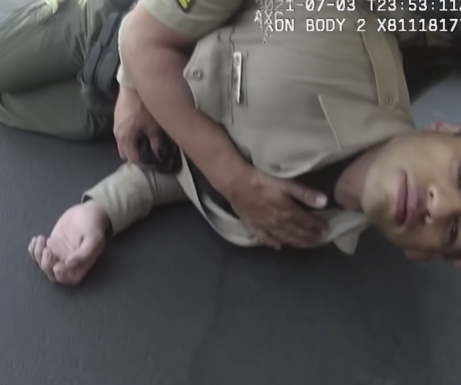Video has been widely discredited by public health experts, toxicologists and doctors who said the widespread hysteria over handling fentanyl harmed the ability of police and first responders to treat people who do overdose.
October 25, 2021
Undersheriff Kelly Martinez, the second in command at the San Diego County Sheriff's department, said she was sorry if a viral video of a deputy supposedly overdosing from fentanyl hurt the department's credibility. But she didn't completely disavow it.
Martinez's public comments about the video came during a debate among the three candidates for sheriff Thursday as part of Voice of San Diego's Politifest. She's running to replace her boss, Bill Gore. The video has been widely discredited by public health experts, toxicologists and doctors who said the widespread hysteria over handling fentanyl harmed the ability of police and first responders to treat people who do overdose.
They accused San Diego's sheriff of contributing to that hysteria.
Martinez said the video had since been taken down. It has not. It was still available on the department's YouTube channel this week and has more than 5.3 million views since August.
Martinez also said the episode had been an educational one for the department, which now trying to build better partnerships with the medical community. The deputy's partner believed he was overdosing, she said, and the department believed that the release of body camera footage was a public service that would drive home how dangerous fentanyl is. The final product was edited and included interviews with the deputy and his partner.
"We've been taught for years from a number of different sources that that was absolutely what could happen with the fentanyl exposure," she said.
The video was quickly and swiftly challenged after its release, as medical professionals lined up to argue that the deputy did not show signs of a fentanyl overdose and that it's not possible to overdose by merely touching the substance. Large numbers of people have died from consuming fentanyl, a synthetic opioid, but even high doses are unlikely to be absorbed through the skin.
The video touched a nerve, becoming yet another example of the uncritical way some journalists pick up and package narratives pushed by law enforcement for mainstream audiences. The original Union-Tribune's initial story was framed entirely through the sheriff's perspective and offered a view of how police perceive powerful drugs — "an invisible killer" — and addiction by extension.
As the criticism rolled in, the newspaper's publisher told Poynter, "It seems we let our guard down." In a follow up story, Gore said he concluded the deputy had been overdosing and made the decision to publicize the video without any input from physicians, weeks after it had happened. The fentanyl was tested but the deputy didn't undergo a toxicology screening at the hospital, according to the sheriff's department.
At the debate, Voice of San Diego CEO and editor-in-chief Scott Lewis said the video showed how far an assumption can go before it's corralled. He asked Martinez if the department had changed its internal process before communicating with the public.
"There should be more collaboration between law enforcement and medical profession, particularly surrounding drug use and drug exposure," she said.
Over the course of the discussion, though, she also placed part of the blame on the deputy, who "should have done some things differently when he was working with the drug," she said.
Martinez didn't specify what those were.
In unedited footage, later released by the department, the deputy falls down a few seconds after his partner warns him about the fentanyl in their possession.
"That stuff is no joke," the partner said. "You gotta be real careful."
At the debate, Dave Myers, a former sheriff's commander who's also running for sheriff, disagreed that the deputy had done anything wrong. He said the deputy told paramedics that he had a history of passing out. In the unedited footage, the deputy is asked about his medical history as he's regaining consciousness and can be heard saying, "This is probably my sixth or seventh time I've fallen on my head."
John Hemmerling, assistant city attorney for San Diego, who's also running for sheriff, described drugs and substance abuse as a public health matter that should addressed upfront rather than on the back end by law enforcement.
"If you had a good marriage with the public health side of this and the medical side, which covers the whole spectrum of a lot of things that the Sheriff's Department does, you would be able to get accurate and transparent information out to the public as quick as possible," he said.
